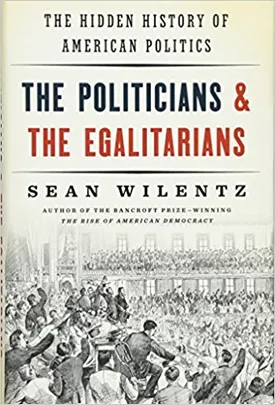The Politicians and the Egalitarians: The Hidden History of American Politics by Sean Wilentz
The Politicians and the Egalitarians: The Hidden History of American Politics by Sean Wilentz is an expansive examination of the forces that have shaped American politics. Drawing on extensive research and deeply insightful analysis, Wilentz uncovers a dramatic movement in the history of America’s political development. From the Framers of the Constitution to the election of Abraham Lincoln and the rise of the New Deal, Wilentz reveals the relentless struggle between “the politicians” and “the egalitarians” in the ever-evolving quest for justice and equality.
The Politicians and the Egalitarians begins by exploring the establishment of the Constitution and the role the Framers sought to create for the federal government. Wilentz offers a penetrating analysis of how the political and legal issues debated during this period shaped the American governmental structure and the limits of political activity. He examines the role of the three branches of government as well as the checks and balances between them. Wilentz also assesses how and why the Framers failed to address important issues such as slavery and the lack of basic rights for women.
The book then turns to the period of the early nineteenth century when the ideals of liberty and freedom were in the ascendant. Wilentz argues that during this time, American politics were exemplified by the clashes between two major political philosophies: those espoused by the "politicians," who sought to maintain the autonomy of the states, and those of the "egalitarians," who advocated for an increased role of the federal government in protection of basic rights. The conflict between these two visions deepened with the election of Abraham Lincoln and the onset of the Civil War. Wilentz examines the ways in which Lincoln, a "politician" in the true sense of the word, fundamentally changed the course of American political history.
The book further traces the development of American politics through the early 20th century. Wilentz examines the significant changes ushered in by the Progressive Era, World War I, and the New Deal. He shows how egalitarians’ demands for an ever-expanding role for the federal government led to an increase in the size and scope of the state apparatus. At the same time, Wilentz stresses how the counterforce of the politicians ultimately limited the power of the federal government.
Wilentz concludes by examining the contemporary political landscape. He observes how many of the same factors that determined American politics in the period between the Framers and the New Deal continue to shape American politics today. He further analysis how the two major contending forces of the politicians and the egalitarians have been much less visible in modern times, yet remain as powerful forces underlying the current political situation.
The Politicians and the Egalitarians is a comprehensive and compelling examination of the long arc of American political history. Wilentz’s insightful writing and engaging analysis reveal the unseen connections among pivotal events and figures over time, and evoke the timeless questions of law, power, and justice that have influenced the development of American democracy. The book is an essential read for anyone interested in the history and dynamics of American politics.

